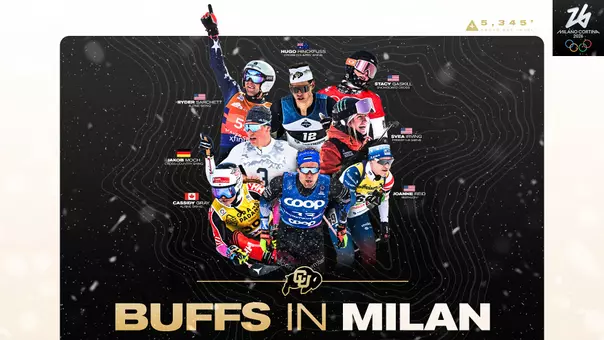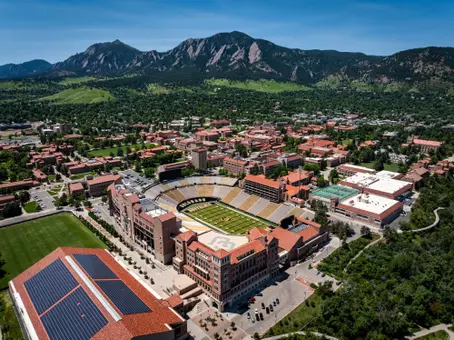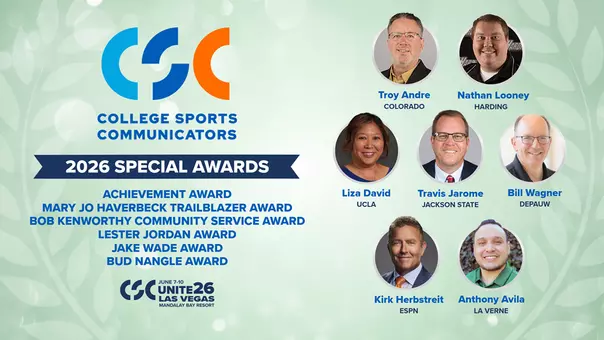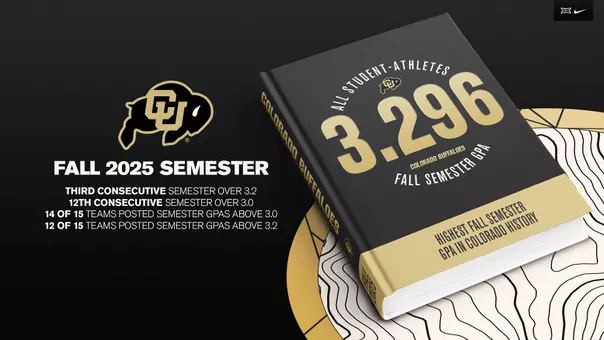Colorado University Athletics
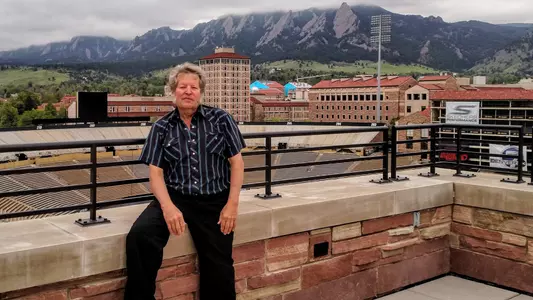
After 44 Years At CU, Templeton Stepping Down
June 09, 2017 | General, Neill Woelk
BOULDER — Unless you are intimately familiar with the inner workings of the University of Colorado, you likely don't know the name John Templeton.
But if you have attended even a few events on campus over the years — from football games to the Conference on World Affairs to major concerts to poetry readings — you have almost assuredly seen and/or heard Templeton's work.
Templeton is technically a "senior technical director/audio engineer" for the university.
In reality, he is the guy whose vast reservoir of knowledge in the areas of sound, stage lighting, production and photography have made him an invaluable resource to every department on campus at one time or another for decades, and a legend in the business as well.
Decades?
Indeed. Officially, Templeton's career began at CU on March 1, 1973, meaning he just passed his 44th anniversary at the school.
But in reality, his association with CU — and the beginnings of his lifelong love affair with the fine art of production — began much earlier.
"I got to hang out here as a kid, starting in about 1965, sitting backstage at Mackey Auditorium on a stool with my dad (Earle Templeton) and (longtime CU employee) Alan Cass, learning the craft," Templeton said. "That's how my interest was sparked. Once I got to experience the world backstage, I knew that was it. I was hooked."
That hook will finally loosen its grip this summer, as he will put the wraps — at least in terms of a full-time basis — on his final year at Colorado, a career that has seen him provide sound and stage expertise for some of the biggest events in CU history. He has worked appearances by sitting U.S. presidents (Barack Obama), some of the biggest rock and roll shows in Folsom Field's long concert history (Rolling Stones, Grateful Dead, The Who, Paul McCartney, Simon and Garfunkel) and the vast majority of CU football games and basketball games in the last 30 years.
But don't ask him how many events he's worked. Fact is, he has no idea.
"The simple task of putting out a microphone can be considered an event, and you do that up to the full-fledged national events, like when Obama was on campus," Templeton said. "In the end, they are all events and they are all important."
Indeed, throughout the years, Templeton has approached his craft with that simple philosophy: every event demands his best effort.
"In the end, an event is an event is an event," he said. "It really doesn't matter the content — each individual event, be it a large stadium show or a single person reading poetry to an audience of one at Old Main, is extremely important to the people on stage and the audience. From a technical point, you put your reputation on the line no matter the size of the event. I've never prioritized an event. They are all important."
Templeton's work has stretched from one end of campus to the other — and beyond. He has worked numerous meetings of the CU Board of Regents, been involved with all manner of shows and performances connected with the CU College of Music, worked closely with the International Film Series and Executive Director Pablo Kjolseth, performed stage and lighting duties for hundreds of theater performances in every venue on campus, made sure audio at press conferences was up to snuff, and had a hand in literally thousands of other events through the years.
But one of his favorite duties?
"Pushing film and cinema at Chem 140," Templeton said of the longstanding and still-popular movie showings at CU's largest lecture hall. "I've always enjoyed that."
Not that he doesn't have plenty of memories of other events. Some that he remembers (in no particular order):
Three appearances by President Barack Obama. "Not everyone gets a chance to work an appearance by a sitting president."
Conference on World Affairs. "Something always interesting and always different."
The 1989-90-91 Buffs football run that saw Colorado win a national title, two straight Big Eight titles and tie for a third. "You could feel the excitement in the crowd every game."
Board of Regents meetings. "It might not sound exciting, but that's where the policy and direction of the university is dictated. Over the years, there have been some interesting moments."
Major concerts. "Honestly, Simon and Garfunkel was probably one of my favorites of all the stadium shows because it was a little quieter."
Odyssey of the Mind competition. "A big event that used a lot of facilities — classrooms, auditoriums, arenas. Making sure everything was working was a task."
Those are a mere handful of the thousands of events he has worked. Another one that he fondly remembers?
"I don't remember a lot of specific games, but one that sticks out is 62-36," he said with a laugh, referring to Colorado's football win over Nebraska in 2001. "They had beaten us a lot over the years and to beat a team of that caliber in that way was a fun day."
Bu, Templeton also admits that many of the games over the years simply blend together.
"The wins and losses … from the tech side, you just wanted to make sure everyone had the best experience possible from your end," he said. "Some people don't understand it when I tell them this, but I lump sports into doing theater because to me, sports is theater in the round. You have a stage, you have performers, you have audience, lighting and sound. It's like the unknown ending to a movie … it's theater. It starts from the stage out."
It is the same, he said, with many other productions.
"Sporting events, symphonies, theater — you can't watch them that closely," he said. "You are concerned with what you control. You know your queues, you know what you have to do and you get the job done."
(He does, however, remember when a major act, John Cougar Mellencamp, was booed off the stage at a Folsom Field show. "That just doesn't happen very often," he said. "You remember things like that because it's nothing you expect to happen.")
But while he doesn't remember all the events that ran smoothly — a number that easily reaches into the thousands — he does remember when he and his crew narrowly averted disaster.
"Folsom Field, up and running and an hour and half before curtain — kickoff in football terms — the stadium system went dead," he recounted. "It turned out it was the fiber optic receiver failed. One of those situations where it was a matched pair on the send unit in the audio booth to the roof amp room. We had about a half an hour to make something work. I pulled out the auxiliary system we have down in the basement and I got the Program Council system and we set it up on the roof. We made kickoff and I don't think anybody noticed the difference."
There was also the small concert that almost didn't happen.
"The digital console power supply on the onboard computer failed right at showtime," he said. "I went into the closet, grabbed three old mixers, patched the mikes into that and ran the show that way. Got through and once again, I don't think anybody in the audience noticed the difference."
It is not a stretch to say that Templeton knows more about the campus, its facilities and its people, than perhaps anyone else. He has worked with virtually every department at one time or another and in just about every building. He has installed sound and lighting systems across the breadth and width of campus, and knows intimately the nooks and crannies that most people don't even know exist.
He also possesses a wealth of institutional knowledge that will be difficult — if not impossible — to replace.
"John is one of those people who can't be replaced by one person,'' said J.C. Ancell, former executive director of the Program Council and UMC associate director. "It will take a cadre of people, a crew, to replace him.
"What's going to be hard is that he has reached into so many departments and in so many places, I don't think anyone really knows all of the projects he's been involved with, all of the systems that he has installed and maintained — and he is the only one with the knowledge of those systems. His hand has been so pervasive at the university, I think it's going to be a shock for people when some of those systems need maintenance, or a project that's been ongoing isn't going so smoothly and no one can really put their finger on the reason why. It's going to be because John used to do those things without prompting."
Ancell is one of a number of people with whom Templeton worked closely over the years, people he said had a great influence not only on his career, but on the upward trajectory of the university. Others include Cass, Kjolseth, Jon Burianek (Athletics) and Don Yannacito (Film Studies).
"Things have definitely changed over the years," Templeton said. "There are more levels of people you have to go through to get something done, more levels of people who are in charge of what you do. Years ago, everybody knew what you had to do and you just did it. Now, they've added more buildings and more jobs but not more manpower. You try to explain what you are doing, but in the end, you do your best and you get it done. That's one thing I'm proud of — I've always done my best, no matter the event or venue."
Templeton will wrap up his career by helping with the Dead and Co. show on campus this weekend, and will have several more events through June and early July. One of the students he helped get started in the business, Russ Allen, recently returned to the university to help Templeton and will assume many of his duties when he leaves.
"That's probably a side of him not a lot of people saw — he was a great mentor for students," Ancell said. "He was a friend and mentor to a lot of the young kids who started their careers with him."
Clearly, it's been a career that Templeton has enjoyed, one that has afforded him the opportunity to work in a wide variety of settings and provide him a first-hand look at some seminal moments in CU history.
But the biggest driving force, he said, hasn't changed.
"I always enjoyed working with students," he said. "Sometimes people forget that's what a university is about — the students. I enjoyed commencement, seeing the students get their degrees. I enjoyed seeing students do great things — band, symphony, theater, sports. College is about students and giving them a chance to learn and excel. That's really what it is all about in the end — and that's probably what I'm going to miss the most."
Contact: Neill.Woelk@Colorado.edu


